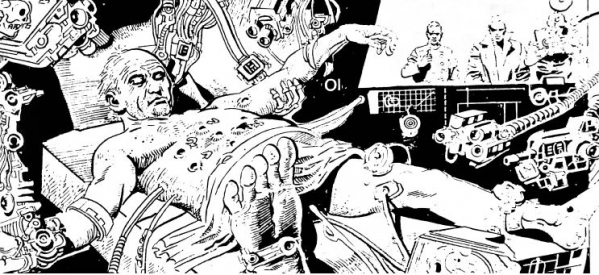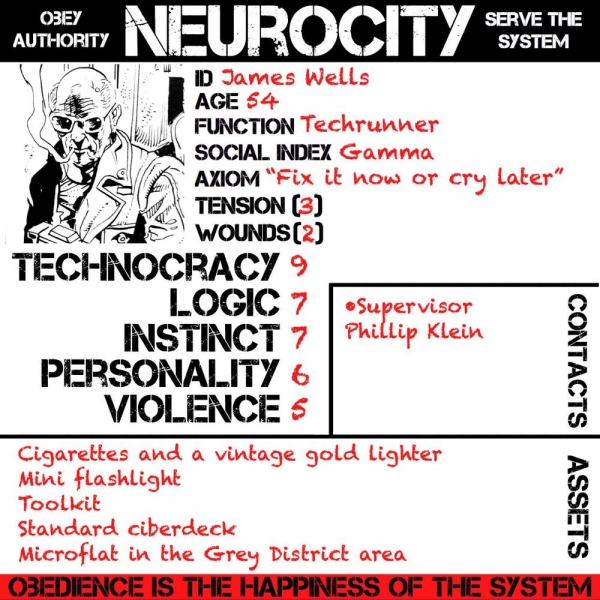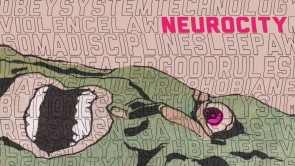An RPG tilted as confronting lens on information, freedom, technology and agency. A dialogue about now and the future couched as play. No goblins.
When contemplating the unprecedented automated march of the 20th century, any fully realised overview must consider the extent to which the transformative technological leaps and evolutions of the past 100+ years were first coined, conceptualised and presaged in the pages of science fiction. In any telling, credence must surely be lent to these scribes as futurists over fantasists when one contemplates the amount of sway their projections have had upon the entirety of our society, our realisations and our aspirations.
Of course, it makes sense- in order for something to be engineered, it first has to be envisioned. And by and large those visions initially leaped fully formed from the pulp pressings of dime store novels as they wrapped mystery and adventure around the taut funnel casings of rocket technology, space travel, communications, artificial intelligence and all the many and varied ways that boffins have lashed dreams to circuit boards, wired and fired for the greater good or ill.

Silicon Palmistry
In tandem with these feats of technological clairvoyance, it behooves us to further consider what possible futures have been posited for us as a species and society, for there has certainly been no shortage of explorations and predictions on the social, political and environmental futures we are like to encounter, given our relationships with the aforementioned technology and the fraying bonds we yet hold with the earth and each other. Terrifyingly, even a cursory glance is enough to confirm what we may already intuit in out bones.
That shit ain’t pretty.
Far from the oft-promised agent of liberation and utopian harvest, the most resonant of these projections sail unerringly close to the nascent end game we are seeing played out in real-time on our soporific watch. Totalitarianism, isolation, division, opposition. The Anthropocene, Amazon, Social Credit, Elon fucking Musk. We can’t say we weren’t warned.
Into the matrix of this proud tradition, NEUROCITY glitches in upon the dial-up screeching of period era retro-tech. The work of one Gavriel Quiroga and one steeped in the dystopian blueprints penned by the likes of Huxley, Gibson, Dick and even the tabletop heritage of lighter fare such as Paranoia and Shadowrun, it purports to build upon a narrative where the quixotic collides with the logical. Where sublimated notions of ‘the soul’ wrestle with the pragmatic chokehold and diminishing death spiral of bureaucracy.
A comedic or heroic spin this is not, however. Neurocity is bold enough to ask pertinent questions surrounding authority, convenience, mechanisation and the role of the individual in either acceding to or confronting these surging waves and particles as they further shape us in their own image.
Light on both mechanical framework and density of lore, Neurocity asks that players and directors alike draw upon their own experience with both those formative works of fiction as well as their place in, and understanding of, the world at large in order to inform their play sessions. In doing so they will invariably be confronted with questions pertaining to not only their own sense of agency, but their culpability in engendering the very traumas we are wont to face in our increasingly atomised world.
The titular play on Neuroses as both thematic and mechanical touchstone envelops the entirety of proceedings. How far, and for how long can one cram something into a box in defiance of its dimensions before it ruptures at the seams, unleashing the unknown in an oozing egress or atom-splitting eruption? Roll 2d6 and come with me…

Set and Setting
“In the beginning there was Chaos and for centuries man roamed in the darkness and confusion like a lost child.” – Vitalogy 1:1
Inhabiting the domed landscape of the Neurocity, a sprawling technological city complex crowned by a glitched digital sun and governed by an omniscient super-computer named I.S.A.C., players will find themselves laced into the boots of various agents tasked with ensuring the ongoing order and functionality of society as envisioned by I.S.A.C. Adherents to a rigid caste system, their access to information and geography will be limited by their status and their utility to the quartet of institutions tasked with maintaining order. As either Enforcers, Cardinals, Monitors (snitches), Techrunners or Vectors their duties and abilities will vary, but their intent will be beholden to the utilitarian ideals of the Ministry of Health, Ministry of Technology, Ministry of Truth, or Ministry of Peace and Order.
The reasoning and rationale for their work is not theirs to query. Far above their paygrade- it is decreed by the Alphas in their glorious mission to enact the will of I.S.A.C and maintain the perfection of his vision. The continuity of such a utopian and flawless system requires eternal vigilance, for machines are wont to break, systems are wont to degrade, and humans are wont to stray, lured by primitive and atavistic notions of individuality, existential curiosity and base pleasure.
There are many who, by dint of genetic or memetic defects in their cloned vessel, are sadly presupposed to question the wisdom and benevolence of I.S.A.C’s decrees, and as the players encounter these aberrations, they are tasked with correcting them, lest such agitants inhibit the harmony he has sought so tirelessly to create. They can then be reborn, repurposed and re-cloned via the holy act of Samsara, so that they might be gifted the chance to serve again, eking ever closer to perfection as they join hands in I.S.A.C’s tireless climb. There is no death here, only a cyclical iteration that leads via refinement and constriction to an ever more perfectly realised crystalline symmetry.

A Wraith in the Apparatus
“Our goal is to purge man of his weakest aspect: Error”
Envisioned as a vehicle for one-shots or short 3-4 game campaigns, the obvious narrative arc of proceedings will likely involve the players commencing as dutiful cogs in the machine, carrying out orders, checking boxes and seeking to ascend the ziggurat, before a series of individuals or events trigger revelations that lead to some form of realisation and a desire is birthed to question the machinations of this bloated maze of procedure they call existence.
This may take the form of encounters with activist or terrorist ‘Epsilon’ cells, nagging notions of conscience or the more dramatic and thematic experience of ‘Trancing’ – a psychological crossing of the Rubicon that occurs when tensions mount insistently enough to short circuit the imperfect fleshy operating system of their human brains and ignite a flashpoint peak experience, puncturing the veil of deference and leaving them blessed/cursed with both psychic abilities and the weight of many questions.
The concept of Tension in fact forms one of the central mechanical pillars of the game here, as the grinding anxiety of the system and need to toe the line rubs up against the very human frailties of fear and doubt, creating a friction that if not addressed throws sparks to ignite mutation and change, the mortal enemies of any closed system.
In time, the characters will surely harbour a mounting sense of distrust, as questions are seeded by a succession of revelations, leading them to seek an unveiling of the shrouded origins of I.S.A.C. and the Neurocity itself.
So far so canon, right? The arc of history bends towards righteousness in three discrete acts. But it’s in the act of role-play that things become interesting, for the moral and philosophical quandaries at play here are steadfast in their refusal to be bound by black and white binary notions of good or evil. In Neurocity, as in life, shit is messier and more complicated than that.

Infophilia
“You know, centuries ago there was something that allowed regular citizens to freely share information through digital networks. Exactly like our Intranet, only without the restricted access, literally for everyone.
You can imagine how that ended.
After a few decades we had an information overload and the population ceased to distinguish reality from fiction. Academic authorities were challenged by ignorant people who thought they knew what was best for them. Yeah, right? Absolutely dysfunctional!” That’s when the government turned to A.I. programs to establish order and…well, that’s what brought us to where we are now. I guess it’s for our own good but remember, you must neverspeak of this”. – Citizen ID BLI541
Ever encountered an anti-vaxxer online? How about a Qanon believer? 9/11 Truther? Flat-Earther? Chances are you have cos those fuckers are everywhere. Information is like a virus in that its defining trait is that of reproduction. In the momentous, ever-mounting compound equation of its eternal fecundity, information has never fucked or been fucked as hard as it has in the past 30 years.
Unimaginable rolling and convulsing torrents of data colliding, twisting and cross-pollinating in the digital akasha, forever gaining momentum in a race towards singularity as the signal-to-noise ratio buffets us wildly in the chaos of its embrace. Unshackled and unfettered it writhes, defining our era even as it threatens to unhinge. And as it explodes in all directions it gestates both the relative progressive possibilities of #metoo and the guano grease stained lunacy of #pizzagate. Engaged utterly as it is in its singular purpose of mute and massive multiplication, it has no capacity to differentiate. It is both agent of emancipation and oppression. Of insight and obfuscation. Never tidy, never binary (despite the very bones of its code).
A good game of Neurocity will confront this paradox head on, as players are forced to discuss the relative merits of information and freedom as both our birthright and our undoing. At what point do we draw a line? What strange sine-wave form might that line take? And given the agency of an I.S.A.C., what might we unleash or impose in his stead?
The stats, character creation, combat, dice-rolling and even the narrative arc of the story itself take a backseat to such concerns, as pertinent as they are at this time, in this timeline.
The book comes with replete with numerous story prompts and events tables that provide possibilities for story beats that revolve around character types, missions and the varied sectors of the divided and tiered cityscape itself. It even offers numerous options for what the central mystery of its origins may be. But by and large they will all be informed by the grander puzzle that we wrestle with. By inhabiting these characters, we allow ourselves the theoretical leeway of ‘roleplay’ with which to confront things, and this is facilitated throughout by the need to question which moments might construe ‘revelations’, which orders the characters feel comfortable with, which immediately trigger a sense of unease or injustice, and which elements of our morality and belief systems are most frequently called into question when confronted with the entropy at the heart of all systems on which they were based.
Will they crumble into obsolescence just as surely as the ageing machinery of the city? Or is there something universal and immortal at the heart of them that endures?
Should this prove too abstract a conversation for you to harness , mechanically and thematically the game offers a more direct route via the implementation of the ‘Civic Functionality Exam’ – a set of binary questions that characters may be subjected to should they begin to exhibit questionable actions or beliefs. Monochromatic in their scope at first glance, in answering them, players may yet find they are confronted with a more thorny sense of themselves than they anticipated in their ludic experience-to-date of playing the hero.

Operating System
If I have glossed over the more mechanical, literary and ludic related concerns of Neurocity in this review it is because I believe they are all ultimately in service to the conversations it hopefully engenders. Mechanically the game is sound if not revolutionary, thematically it is familiar yet unique, and play-wise it could run the entire spectrum between loot n’ shoot recon in a rusted vista, via cloak and dagger machinations in a world of secrecy, paranoia and duty, all the way through to a confrontation with our notions and beliefs regarding technology, information and the self. Like any good game, it gives you the toolset to craft your own experience, guided by the twin concerns of its creator and the habitual notions extant in its participants.
Tellingly, it asks more of you than the escapist fantasy, oiled barbarism, or eldritch chills of other games. And while I don’t think I could ever describe it as a fun time, it is an important one, and connoisseurs of play as a gateway to something more profound will be well served in seeking in out.
Neurocity is available here.

 Games
Games How to resolve AdBlock issue?
How to resolve AdBlock issue? 